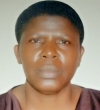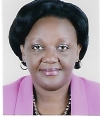Edward Mukiibi
ID:
|
RESEARCH DATA MANAGEMENT PRACTICES IN SELECTED HEALTH INSTITUTES IN UGANDA
REFNo: HS1714ES
i) To describe the characteristics of research data created and held in selected Health Institutes in Uganda.
ii) To examine the research data management practices in selected Health Institutes in Uganda.
iii) To evaluate research data management readiness of selected Health Institutes in Uganda.
iv) To explain the challenges affecting adoption and uptake of RDM practices in selected Health Institutes in Uganda.
v) To propose interventions to improve RDM practices in selected Health Institutes in Uganda.
|
Uganda |
2021-09-08 |
2024-09-08 |
Medical and Health Sciences |
Non-Clinical Trial |
Degree Award |

|
Zarin Machanda Machanda
ID:
|
The form and functions of leadership in wild chimpanzees
REFNo: NS288ES
This project will establish chimpanzees (Pan troglodytes) as a new comparative model of human-like leadership by testing how individual variation across a leader’s temperament, behaviour, and physiology shapes collective action in natural social groups. The first aim of the project is to support continuing long-term data collection by the Kibale Chimpanzee Project. We have three additional research aims that are specific to this project: (1) to identify and describe different domains of leadership in wild chimpanzees; (2) identify and describe the characteristics of chimpanzee leaders; and (3) evaluate the success of different pathways to leadership for chimpanzees. This project aims to collect both observational and experimental data that will provide detailed empirical insight into leadership among wild chimpanzees
|
USA |
2021-09-08 |
2024-09-08 |
Natural Sciences |
Non-Clinical Trial |
Non-degree Award |

|
Robert Opika Opoka
ID: UNCST-2021-R014036
|
An implementation toolkit for the use of hydroxyurea in the treatment of sickle cell anemia in Ugandan children
REFNo: HS1646ES
1) Assess the uptake and proper use of hydroxyurea among SCA patients at Jinja and Atutur Hospitals as a result of the implementation toolkit pilot,
|
Uganda |
2021-09-03 |
2024-09-03 |
Medical and Health Sciences |
Non-Clinical Trial |
Non-degree Award |

|
Walter Ojok
ID: UNCST-2021-R004415
|
SYNTHESIS OF NOVEL MESOPOROUS ADSORBENTS FOR FLUORIDE REMOVAL FROM WATER
REFNo: NS158ES
(i) To study the hydrochemical characteristics of Ndali-Kasenda crater lakes used as water sources with focus on the occurrence and spatial distribution of fluoride.
(ii) To explore the possibility of synthesizing biosorbents for fluoride removal using local base materials (Phoenix reclinata seeds, cassava starch and banana extract as soft templates.
(iii) To conduct batch and column experiments on removal of fluoride using synthesized biosorbents to assess their fluoride removal performance.
(iv) To design laboratory scale pilot column filter studies for fluoride removal with high performance synthesized biosorbent for Ndali-Kasenda lake water.
|
Uganda |
2021-09-03 |
2024-09-03 |
Natural Sciences |
|
Degree Award |

|
Suzan van der Lee
ID:
|
Dry Rifting In the Albertine- Rhino Graben, Uganda (DRIAR)
REFNo: NS255ES
A geophysical, geochemical, geological, and geodynamic investigation of the Albertine-Rhino Graben in western and northwestern Uganda to improve our understanding of continental rifting in areas where volcanic activity is minimal.
|
Netherlands |
2021-09-03 |
2024-09-03 |
Natural Sciences |
Non-Clinical Trial |
Non-degree Award |

|
Joweria Nambooze
ID: UNCST-2019-R001118
|
FOOD CHOICES AND THE FOOD ENVIRONMENT OF SMALL-HOLDER FARMERS IN MPIGI
REFNo: A146ES
Examine factors influencing maternal food choices and nutrition outcomes and understand how they interact.,Explore the internal and external food environments and how they impact food choice among rural female smallholder farmers,Determine the relationship between agricultural activities on maternal time use and food choices among rural female smallholder farmers,Determine the daily time use patterns of rural female smallholder farmers,Assess the nutritional status of rural female smallholder farmers,To examine the dynamic interactions between women’s time use and food environments and their influence on food choices and nutrition outcomes of rural smallholder female farmers living in Mpigi district,
|
Uganda |
2021-09-03 |
2024-09-03 |
Agricultural Sciences |
Non-Clinical Trial |
Non-degree Award |

|
Tu Hoang Phuong
ID:
|
Forest succession analyses in Kitigo as a basis for close-to-nature reforestation planning
REFNo: NS279ES
To understand the details of termite-fungi relationships in the context of soil nitrogen allocation in Central African derived savanna; to clarify and classify the Nitrogen absorption strategies of various woody species/tree families, in order to develop crucial criteria for tree species selection for Nitrogen limited target sites; to work out if Nitrogen-15 of tree’s living sapwood could be an indicator for soil nitrogen availability.
|
Vietnam |
2021-09-03 |
2024-09-03 |
Natural Sciences |
Non-Clinical Trial |
Degree Award |

|
Cristina Clerici
ID:
|
Yes, women can. The role of information and norms in encouraging women to enter male-dominated sectors in Uganda
REFNo: SS968ES
Gain insights on information available to aspiring female entrepreneurs and the constraints they face when choosing their sector of business.
|
Italy |
2021-09-03 |
2024-09-03 |
Social Science and Humanities |
Non-Clinical Trial |
Degree Award |

|
Ziidah Namwaya
ID:
|
Exploring the use of Active Birthing Techniques for Normal Labour and Birth among Midwives working in the Metropolitan Region, Kampala-Uganda
REFNo: SS976ES
1. To evaluate the status of the environment in the three health facilities Kitebi, Komamboga and Kisugu as regards the use of active birthing techniques
2. To identify the available active birthing techniques at the health facilities
3. To assess current practice as regards the use of active birthing techniques for normal labour and birth among midwives working at the health facilities
4. To determine the level of knowledge as regards the use of active birthing techniques
5. To explore the potential factors that might influence the use of active birthing techniques for normal labour and birth among midwives working at the facilities
6. To describe the acceptability and experience of using upright positions such as hands- and-knees position, squatting, leaning forward, kneeling among pregnant women and midwives in the selected health facilities.
|
Uganda |
2021-09-03 |
2024-09-03 |
Social Science and Humanities |
Non-Clinical Trial |
Degree Award |

|
Solomon Wafula Tsebeni
ID: UNCST-2021-R013883
|
Assessment of indoor air quality, risk factors and potential health effects among residents in an urban informal settlement in Kampala, Uganda
REFNo: SS996ES
To describe the potential health effects associated with indoor air pollution. ,To assess the factors associated with indoor air pollution among households. ,To determine the levels of indoor PM2.5, and Carbon monoxide (CO) in households., To determine levels of indoor air pollution, its associated risk factors and potential health effects among residents in an informal settlement in Kampala so as to generate information that can be used in design appropriate strategies, policies and practices that promote good air quality in households, hence mitigate health problems associated with indoor air pollution. ,
|
Uganda |
2021-09-03 |
2024-09-03 |
Social Science and Humanities |
Non-Clinical Trial |
Non-degree Award |

|
Amy Ritterbusch Elizabeth
ID:
|
Child Protection Mapping and Honour
REFNo: SS970ES
1.To examine the effect of global narratives of child wellbeing on child protection and rights practices in Uganda
2.To explore prospects for local child protection practices in informing and enriching global child protection policy
3.To explore the concept of honour and examine how it promotes children’s wellbeing and or sustains violence against children in the Ugandan context.
|
USA |
2021-09-03 |
2024-09-03 |
Social Science and Humanities |
Non-Clinical Trial |
Non-degree Award |

|
Jesca Nantume
ID: UNCST-2021-R013984
|
Knowledge, attitudes and practices towards the tobacco use control
measures among teenagers aged (13-19) years; A cross sectional
study in the slum areas of Kampala Uganda
REFNo: SS988ES
To evaluate knowledge, attitudes and practices towards tobacco control among teenagers
aged (13-19) years
1. To evaluate existing control measures among teenagers
2. To assess the knowledge, attitudes, and practices of the current tobacco control
measures among teenagers.
3. To evaluate the cause of initiation of tobacco use in slums among teenagers
|
Uganda |
2021-09-03 |
2024-09-03 |
Social Science and Humanities |
Non-Clinical Trial |
Degree Award |

|
Danette Cagnet Lee
ID:
|
Community-led Total Sanitation Programming and the Maintenance of Sanitation Behaviors
REFNo: SS737ES
The purpose of this qualitative, exploratory, case study research is to better understand stakeholder's, including village community members, village leadership, and CLTS practitioner, perceptions of the facilitators and hindrances to the maintenance of sanitation in the maintenance stage of Community-led Total Sanitation programming in Uganda, East Africa. This study seeks the perspective of and participation of village community stakeholders receiving the Community-led Total Sanitation intervention implemented by the non-governmental organization, Kibo Group International.
|
USA |
2021-09-02 |
2024-09-02 |
Social Science and Humanities |
Non-Clinical Trial |
Degree Award |

|
Joyce Kambugu Balagadde
ID: UNCST-2020-R014996
|
Acute Leukemia Banking and Biology Study for Patients at the Uganda Cancer Institute.
REFNo: HS1590ES
1. To determine the genomic profile of patients with acute leukemia and identify the prevalence of various fusions and mutations in these patients.
2. To collect and store corresponding subjects’ medical information including diagnosis and disease characterization, laboratory and imaging studies, treatment, and outcome.
|
Uganda |
2021-09-02 |
2024-09-02 |
Medical and Health Sciences |
Non-Clinical Trial |
Non-degree Award |

|
John Baptist Asiimwe
ID: UNCST-2021-R013716
|
The Traditional Medicine Practitioner’s Concept of Cancer, its Care, Herbal medicine use and the Patients Perceived benefits (Clinical outcomes) in Selected Districts of Central Uganda.
REFNo: HS1602ES
1. To establish the prevalence and predictors of the use of herbal medicines’ in cancer
2. To explore the concept of cancer and its care in traditional medicine as perceived by traditional medicine practitioners (TMPs) in selected districts of central Uganda
3. To document the herbs used by traditional medicine practitioners (TMPs) to manage cancer in selected districts of central Uganda.
4. To determine the clinical outcomes in patients with cancer treated by traditional medicine practitioners (TMPs).
|
Uganda |
2021-09-02 |
2024-09-02 |
Medical and Health Sciences |
Non-Clinical Trial |
Degree Award |
.jpg)
|
Moses Adriko
ID: UNCST-2019-R001787
|
Gaining community insights into societal causes of and solutions for schistosomiasis transmission hotspots (InSight-ScHot)
REFNo: HS1616ES
To identify non-mass administration preventative chemotherapeutic control measures for schistosomiasis that members of the community see as implementable
|
Uganda |
2021-09-02 |
2024-09-02 |
Medical and Health Sciences |
Non-Clinical Trial |
Degree Award |

|
Enock Matovu
ID:
|
Identification of the Genetic Markers of Trypanotolerance in Indigenous Cattle of Apach District, Northern Uganda
REFNo: NS247ES
Main Objective
To identify genetic markers of Animal African Trypanosomiasis (AAT) tolerance in indigenous cattle
Specific Objectives
i. To set up a panel of phenotypically characterized indigenous cattle with respect to AAT susceptibility
ii. To develop a data base of reference genomes and transcriptomes of indigenous cattle from an AAT endemic region of mid-northern Uganda
iii. To determine the genotypes associated with trypanotolerance in indigenous cattle
|
Uganda |
2021-08-31 |
2024-08-31 |
Natural Sciences |
Non-Clinical Trial |
Non-degree Award |

|
Rhoda Wanyenze
ID: UNCST-2021-R013352
|
Assessment of the Implementation Processes and Outcomes of the HIV Assisted Partner Notification Program, Ministry of Health, Uganda
REFNo: HS1671ES
3.2 General Objective
To assess the Implementation processes and outcomes of the HIV Assisted Partner Notification Program in Uganda
3.3 Study Objectives
1. To determine the current level of uptake of APN services and the factors associated with uptake of these services among HIV index clients.
2. To assess the acceptability and uptake of APN services among a sub-sample of partners of APN clients.
3. To assess the extent to which the existing service delivery environment influences the delivery of APN services.
4. To document the perceptions and experiences of users of APN services, challenges faced in utilizing APN services and concerns those users have regarding the way APN services are provided.
5. To determine the positive and negative outcomes of APN services in Uganda, and the support mechanisms available for those who experience negative outcomes.
6. To document the barriers to and facilitators of successful APN implementation and the challenges implementers face during APN implementation.
7. To document the existing opportunities that can inform the future scale-up of the APN program.
|
Uganda |
2021-08-31 |
2024-08-31 |
Medical and Health Sciences |
Non-Clinical Trial |
Non-degree Award |

|
Pontiano Kaleebu
ID: UNCST-2021-R013577
|
A behavioural Science Research to Determine Factors that Facilitate Future Uptake of HIV Prevention Products and Multi-Purpose Prevention Technologies to Prevent HIV and Unwanted Pregnancy in Sub-Saharan Africa
Universally Accessible HIV Prevention Technologies for African Girls and Young Women through Knowledge Applied from Behavioural Economics (UPTAKE)
REFNo: HS1540ES
Multi-purpose Prevention Technologies (MPTs) to prevent HIV and unwanted pregnancy in Sub-Saharan Africa
i. To understand facilitators of and barriers to uptake and retention of injectable and implantable long acting pre-exposure prophylaxis (LA-PrEP) and MPT to inform product development, using formative behavioural research methods
ii. To design interventions to impact the uptake of new biomedical HIV prevention products, as part of a suite of self-care and self-screening products for sexual and reproductive health, using quantitative behavioural research methods
iii. To test the effectiveness of the alternate design/interventions and strategies, using marketed LA contraceptive products as proxies for LA HIV prevention products in development
iv. To estimate the cost of retention interventions and the cost effectiveness of products and delivery methods among adolescent girls and young women (AGYW) and female sex workers (FSWs) for prevention of pregnancy and/or HIV, using modelling
|
Uganda |
2021-08-31 |
2024-08-31 |
Medical and Health Sciences |
Clinical Trial |
Non-degree Award |

|
Emmy Okello
ID: UNCST-2020-R009792
|
“Active Case Detection and Decentralized Dynamic Registry to Improve the Uptake of Rheumatic Heart Disease Secondary Prevention†(ADD-RHD)
REFNo: HS1561ES
Secondary objectives include technical proficiency, acquisition times, global image quality, and user satisfaction and confidence. Each of these parameters will be reported for the entire training group and a sub-group analysis will look for differences between curriculum groups. Acquisition times and image quality will be compared between trainees and expert sonographers.,To determine the impact of a pragmatic RHD primary prevention program in Uganda,
|
Uganda |
2021-08-30 |
2024-08-30 |
Medical and Health Sciences |
Non-Clinical Trial |
Non-degree Award |

|
| View |
|
Sort By: |
|
|
|
| |
|